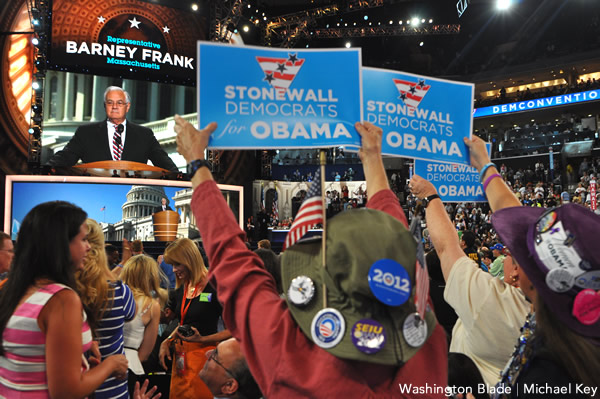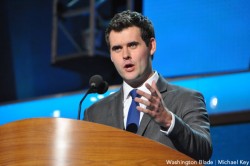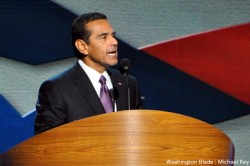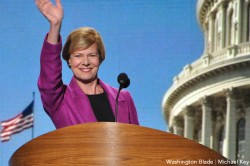National
DNC 2012: Gay speakers, issues take center stage on final night
Prime speaking slots for Frank, Baldwin, Zach Wahls
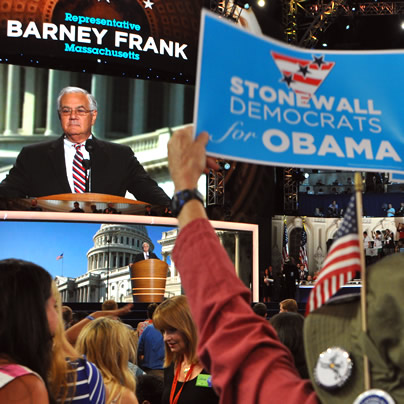
CHARLOTTE, N.C. — Gay issues and speakers took center stage on the final night of the 2012 Democratic National Convention, capping the three-day gathering that was more LGBT-inclusive than any previous iteration of the quadrennial affair.
One of the speeches that came earlier in the evening was from Zach Wahls, an Iowa youth with lesbian parents who gained notoriety for speaking out against a proposed ban on marriage equality in his state. He’s also an Eagle Scout who’s been pushing the Boy Scouts to end its gay ban.
Wahls, who’s straight, said support for the right of gay couples like his parents to marry is a reason he’s supporting the re-election of President Obama, who came out in favor of marriage equality in May.
“President Obama understands that. He supports my moms’ marriage,” Wahls said. “President Obama put his political future on the line to do what was right. Without his leadership, we wouldn’t be here. President Obama is fighting for our families, all of our families. He has our backs. We have his.”
Notably, Wahls cushioned his support for marriage equality by saying the belief that nuptials should be limited to one man, one woman shouldn’t be considered “a radical view,” saying, “For many people, it’s a matter of faith. We respect that.”
But that didn’t stop Wahls from criticizing Romney for opposing same-sex marriage and his support for a Federal Marriage Amendment.
“Gov. Romney says he’s against same-sex marriage because every child deserves a mother and a father,” Wahls said. “I think every child deserves a family as loving and committed as mine. Because the sense of family comes from the commitment we make to each other to work through the hard times so we can enjoy the good ones. It comes from the love that binds us; that’s what makes a family. Mr. Romney, my family is just as real as yours.”
Wahls took to the podium immediately after a video was played showing the Democratic Party’s commitment to marriage equality, including a video with previously recorded remarks of Obama saying the relationships of gay and men women should be respected.
But that video wasn’t the only time support for marriage equality was celebrated on Thursday night. Democratic National Convention Chair and Los Angeles Mayor Antonio Villaraigosa, touted the first-ever inclusion of a marriage equality plank in the Democratic Party platform.
“For the first time, a major party platform recognizes marriage equality as a basic human right!” Villaraigosa said. “This is a reflection of who we are as a party and who we can be as a nation, because as Democrats, as Americans, whenever we’ve opened up our party and our country, whenever we’ve opened up doors for more of our people, whenever we’ve deepened our democracy and renewed our commitment to equal justice under the law, we’ve grown stronger as a nation.”
Villaraigosa was among those who had called for a marriage equality plank prior to its inclusion in the party platform. His invocation of the marriage equality plank in the platform elicited thunderous applause from the audience.
Another video that played at the convention cited Obama’s repeal of “Don’t Ask, Don’t Tell,” playing footage of the signing ceremony for repeal legislation in December 2010 in which Obama said, “For we are not a nation that says ‘Don’t Ask, Don’t Tell,’ we are a nation that says out of many, we are one.”
Following the video, Iraq war veteran and retired Army Capt. Jason Crow, who’s straight, came to the stage to commend Obama for ending the military’s gay ban and expanding veterans’ benefits.
“It was wrong that men and women I served with could be told they weren’t good enough just because of their sexual orientation,” Crow said. “Soldiers who I trusted with my life, and fought alongside with, could be discharged because of who they loved. President Obama did the right thing by ending ‘Don’t Ask, Don’t Tell.'”
Support for President Obama also came from Alejandra Salinas, a 23-year-old law student at Boston College and member of the LGBT and Latino community.
The outgoing president of the College Democrats of America, Salinas praised Obama for both his support for the LGBT community and the Latino community.
“This president, on so many issues — immigration, LGBT rights, women’s health — has proven that he cares about all of us, and that he’ll keep on expanding opportunity,” Salinas said. “As a young, LGBT Latina, it seems to me that Mitt Romney only cares about an elite few.”
Perhaps the two most high-profile openly gay public officials — Reps. Barney Frank (D-Mass.) and Tammy Baldwin (D-Wis.) — took to the stage earlier in the evening. Both are set to leave the U.S. House at the end of this year, although Baldwin may return to Congress as U.S. senator if she’s successful in her campaign for a seat to represent Wisconsin in that chamber.
Frank, the longest-serving openly gay member of Congress, assailed Republican presidential nominee Mitt Romney both for his positions on LGBT rights and claims regarding his success as governor of Massachusetts, calling the candidate “Myth Romney” for the allegedly false assertions he’s made.
Frank took a jab at Romney over his changing positions on gay rights over the course of this year, saying he once sought to surpass the late Sen. Ted Kennedy, but now looks to anti-gay former U.S. Rick Santorum on the issue. Frank was referring to a 1994 letter from Romney in which he pledged to Log Cabin Republicans to be a leader on gay rights and to support the Employment Non-Discrimination Act — a position he no longer holds.
But a significant portion of Frank’s speech was devoted to criticizing Romney for wanting to repeal financial reform, which Frank took the lead in passing as chair of a House banking committee.
“As governor of Massachusetts, the real Mitt Romney’s record on job creation was terrible,” Frank said. “During his term, net job growth was less than one percent, about one-fifth the national average, 47th in the country. The myth of Romney is that he never raised our taxes. In fact, the real Mitt Romney called his tax hikes “fees.” And in his first year alone, he raised fees more than any other governor in office. Some of those fees? Mitt created a $10 fee for a “certificate of blindness.” He increased the cremation inspection fee from $50 to $75. Maybe he didn’t call them taxes, but they felt like taxes.”
The line about gay rights was apparently an ad-lib because it wasn’t included as part of his prepared remarks.
Asked whether the line was an ab-lib and if Frank was winging it while speaking, Harry Gural, a Frank spokesperson said, “He doesn’t ‘wing it’ — his comments are always very well thought through. He never simply reads speeches, even his most lengthy and complex ones. That’s what makes him such a compelling speaker.”
Earlier in the day, Frank faced criticism for saying during the Democratic National Committee’s LGBT caucus meeting that the Log Cabin Republicans were an “Uncle Tom” organization. In a statement, R. Clarke Cooper, executive director of Log Cabin, responded with his own attack, saying, “It’s a badge of honor to be attacked by a partisan hack like Barney Frank.”
Baldwin’s speech marked the first time an openly gay U.S. Senate candidate spoke before a major party’s national convention.
“But the Wisconsin I know, knows that having two sets of rules makes no kind of sense,” Baldwin said. “We believe in hard work. For decades, we’ve worked to make things: paper, engines, tools, ships—and, yes, cheese, brats, and beer. Give our workers a fair shot, and we’ll compete against anyone.”
Baldwin identified Obama’s repeal of “Don’t Ask, Don’t Tell” as evidence of his work in making “historic progress toward equality” for the country and made an oblique reference to Romney’s support for a U.S. constitutional amendment banning same-sex marriage.
“He repealed ‘Don’t Ask, Don’t Tell,’ so that no American ever again has to lie about who they are in order to serve the country we love,” Baldwin said. “Republicans want to write discrimination into our Constitution. But the Wisconsin I know believes that with each passing year and each generation, our country must become more equal, not less.”
U.S. Supreme Court
Supreme Court to consider bans on trans athletes in school sports
27 states have passed laws limiting participation in athletics programs

The U.S. Supreme Court on Thursday agreed to hear two cases involving transgender youth challenging bans prohibiting them from participating in school sports.
In Little v. Hecox, plaintiffs represented by the ACLU, Legal Voice, and the law firm Cooley are challenging Idaho’s 2020 ban, which requires sex testing to adjudicate questions of an athlete’s eligibility.
The 9th U.S. Circuit Court of Appeals described the process in a 2023 decision halting the policy’s enforcement pending an outcome in the litigation. The “sex dispute verification process, whereby any individual can ‘dispute’ the sex of any female student athlete in the state of Idaho,” the court wrote, would “require her to undergo intrusive medical procedures to verify her sex, including gynecological exams.”
In West Virginia v. B.P.J., Lambda Legal, the ACLU, the ACLU of West Virginia, and Cooley are representing a trans middle school student challenging the Mountain State’s 2021 ban on trans athletes.
The plaintiff was participating in cross country when the law was passed, taking puberty blockers that would have significantly reduced the chances that she could have a physiological advantage over cisgender peers.
“Like any other educational program, school athletic programs should be accessible for everyone regardless of their sex or transgender status,” said Joshua Block, senior counsel for the ACLU’s LGBTQ and HIV Project. “Trans kids play sports for the same reasons their peers do — to learn perseverance, dedication, teamwork, and to simply have fun with their friends,” Block said.
He added, “Categorically excluding kids from school sports just because they are transgender will only make our schools less safe and more hurtful places for all youth. We believe the lower courts were right to block these discriminatory laws, and we will continue to defend the freedom of all kids to play.”
“Our client just wants to play sports with her friends and peers,” said Lambda Legal Senior Counsel Tara Borelli. “Everyone understands the value of participating in team athletics, for fitness, leadership, socialization, and myriad other benefits.”
Borelli continued, “The U.S. Court of Appeals for the Fourth Circuit last April issued a thoughtful and thorough ruling allowing B.P.J. to continue participating in track events. That well-reasoned decision should stand the test of time, and we stand ready to defend it.”
Shortly after taking control of both legislative chambers, Republican members of Congress tried — unsuccessfully — to pass a national ban like those now enforced in 27 states since 2020.
Federal Government
UPenn erases Lia Thomas’s records as part of settlement with White House
University agreed to ban trans women from women’s sports teams

In a settlement with the Trump-Vance administration announced on Tuesday, the University of Pennsylvania will ban transgender athletes from competing and erase swimming records set by transgender former student Lia Thomas.
The U.S. Department of Education’s Office for Civil Rights found the university in violation of Title IX, the federal rights law barring sex based discrimination in educational institutions, by “permitting males to compete in women’s intercollegiate athletics and to occupy women-only intimate facilities.”
The statement issued by University of Pennsylvania President J. Larry Jameson highlighted how the law’s interpretation was changed substantially under President Donald Trump’s second term.
“The Department of Education OCR investigated the participation of one transgender athlete on the women’s swimming team three years ago, during the 2021-2022 swim season,” he wrote. “At that time, Penn was in compliance with NCAA eligibility rules and Title IX as then interpreted.”
Jameson continued, “Penn has always followed — and continues to follow — Title IX and the applicable policy of the NCAA regarding transgender athletes. NCAA eligibility rules changed in February 2025 with Executive Orders 14168 and 14201 and Penn will continue to adhere to these new rules.”
Writing that “we acknowledge that some student-athletes were disadvantaged by these rules” in place while Thomas was allowed to compete, the university president added, “We recognize this and will apologize to those who experienced a competitive disadvantage or experienced anxiety because of the policies in effect at the time.”
“Today’s resolution agreement with UPenn is yet another example of the Trump effect in action,” Education Secretary Linda McMahon said in a statement. “Thanks to the leadership of President Trump, UPenn has agreed both to apologize for its past Title IX violations and to ensure that women’s sports are protected at the university for future generations of female athletes.”
Under former President Joe Biden, the department’s Office of Civil Rights sought to protect against anti-LGBTQ discrimination in education, bringing investigations and enforcement actions in cases where school officials might, for example, require trans students to use restrooms and facilities consistent with their birth sex or fail to respond to peer harassment over their gender identity.
Much of the legal reasoning behind the Biden-Harris administration’s positions extended from the 2020 U.S. Supreme Court case Bostock v. Clayton County, which found that sex-based discrimination includes that which is based on sexual orientation or gender identity under Title VII rules covering employment practices.
The Trump-Vance administration last week put the state of California on notice that its trans athlete policies were, or once were, in violation of Title IX, which comes amid the ongoing battle with Maine over the same issue.
New York
Two teens shot steps from Stonewall Inn after NYC Pride parade
One of the victims remains in critical condition

On Sunday night, following the annual NYC Pride March, two girls were shot in Sheridan Square, feet away from the historic Stonewall Inn.
According to an NYPD report, the two girls, aged 16 and 17, were shot around 10:15 p.m. as Pride festivities began to wind down. The 16-year-old was struck in the head and, according to police sources, is said to be in critical condition, while the 17-year-old was said to be in stable condition.
The Washington Blade confirmed with the NYPD the details from the police reports and learned no arrests had been made as of noon Monday.
The shooting took place in the Greenwich Village neighborhood of Manhattan, mere feet away from the most famous gay bar in the city — if not the world — the Stonewall Inn. Earlier that day, hundreds of thousands of people marched down Christopher Street to celebrate 55 years of LGBTQ people standing up for their rights.
In June 1969, after police raided the Stonewall Inn, members of the LGBTQ community pushed back, sparking what became known as the Stonewall riots. Over the course of two days, LGBTQ New Yorkers protested the discriminatory policing of queer spaces across the city and mobilized to speak out — and throw bottles if need be — at officers attempting to suppress their existence.
The following year, LGBTQ people returned to the Stonewall Inn and marched through the same streets where queer New Yorkers had been arrested, marking the first “Gay Pride March” in history and declaring that LGBTQ people were not going anywhere.
New York State Assemblywoman Deborah Glick, whose district includes Greenwich Village, took to social media to comment on the shooting.
“After decades of peaceful Pride celebrations — this year gun fire and two people shot near the Stonewall Inn is a reminder that gun violence is everywhere,” the lesbian lawmaker said on X. “Guns are a problem despite the NRA BS.”

